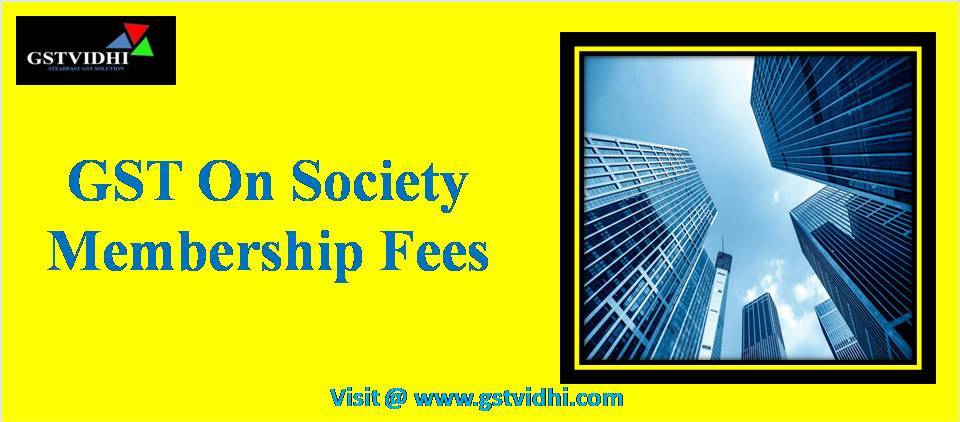
GST on monthly Maintenance
Fees / subscription /contribution
charged by a Residential Welfare Association from its members: A Comprehensive Guide
Goods and Services Tax (GST) is a unified indirect tax that
applies to a broad spectrum of goods and services, including those provided by
Residential Welfare Associations (RWAs) or housing societies. The applicability
of GST on membership fees and other charges collected by RWAs often raises
questions among stakeholders. This article explores the nuances of GST on
society fees, highlighting key legal provisions, exemptions, and compliance
practices.
Legal Framework Governing GST on
RWAs
1.
Exemption
Provisions under Notification No. 12/2017 – Central Tax (Rate):
Entry No. 77 of this notification provides an exemption for RWAs on the
maintenance charges collected from their members. The exemption is valid up to ₹7,500
per member per month, provided the services are for common use in a housing
society or residential complex.
2.
Amendments
in Exemption Limits:
The exemption limit for monthly maintenance charges was increased from
₹5,000 to ₹7,500 per member per month with effect from 25th January 2018.
o Reference: Clause (c) of Sl. No. 77 in Notification No.
12/2017-Central Tax (Rate) dated 28.06.2017, as amended by Notification No.
2/2018-Central Tax (Rate) dated 25.01.2018.
3.
Threshold
for GST Registration:
o GST registration is mandatory for RWAs if their annual
aggregate turnover exceeds ₹20 lakhs.
o Societies with a turnover below this threshold are exempt
from GST registration and payment, irrespective of the monthly charges
collected.
Clarifications from Circular No.
109/28/2019-GST
To address ambiguities, the government issued Circular
No. 109/28/2019-GST (22nd July 2019). The key clarifications include:
1.
Applicability
of Exemption:
o Maintenance charges up to ₹7,500 per member per month
are exempt from GST.
o If the charges exceed this amount, GST at 18% is
levied on the entire amount, not just the excess.
2.
Impact of
Aggregate Turnover:
o RWAs with annual turnover below ₹20 lakhs are not
required to register or pay GST, even if individual contributions exceed
₹7,500.
3.
Separate
Application for Multiple Flats:
o A member owning multiple flats is treated as a separate
member for each unit. The exemption limit of ₹7,500 applies individually to
each flat.
4.
Sinking
Funds and Lump-Sum Collections:
o Lump-sum payments such as sinking funds are treated as part
of the monthly maintenance. If the combined collection in any month exceeds
₹7,500 per member, GST is applicable on the total amount.
5.
Input Tax
Credit (ITC):
o RWAs can claim ITC on GST paid for goods and services used
for maintenance, such as generators, water pumps, and repair services.
6.
Exemption
for Electricity and Water Charges:
o Charges for electricity and water collected on an actual
basis are exempt from GST, provided they are billed separately.
Scenarios Illustrating GST
Applicability
1.
Monthly
Charges Below ₹7,500:
o No GST is applicable, even if the annual turnover of the
society exceeds ₹20 lakhs.
2.
Monthly
Charges Above ₹7,500:
o GST at 18% applies to the entire amount. For example:
§ Maintenance charge = ₹9,000 per member per month.
§ GST = 18% of ₹9,000 = ₹1,620.
3.
Turnover
Below ₹20 Lakhs:
o No GST registration or payment is required, irrespective of
the monthly charges.
4.
Additional
Charges Like Sinking Funds:
o If the monthly maintenance plus sinking funds exceeds
₹7,500, GST applies to the total amount.
5.
Member
with Multiple Flats:
o A member owning two flats pays ₹7,500 for each. The
exemption applies separately to each flat.
Recent Rulings on GST for RWAs
1.
Telangana
AAR Order No. 29/2022:
o Maintenance charges exceeding ₹7,500 are taxable on the full
amount.
o Lump-sum collections like sinking funds are taxable if they
breach the threshold when combined with monthly maintenance.
o Electricity and water charges collected on an actual basis
are exempt.
Compliance Requirements for RWAs
1.
GST
Registration:
o Mandatory for societies with annual aggregate turnover
exceeding ₹20 lakhs.
2.
Invoicing:
o RWAs must issue invoices separating taxable and non-taxable
charges to ensure transparency and compliance.
3.
Record
Maintenance:
o Accurate records of collections, payments, and ITC claims
are essential for audits and compliance.
4.
GST
Returns:
o RWAs must file timely and accurate GST returns to avoid
penalties and interest.
5.
Professional
Assistance:
o Societies are advised to consult tax professionals to
navigate complex GST scenarios.
Impact on Members
The imposition of GST on society membership fees can
increase the financial burden on members, particularly in societies with high
maintenance costs. Members should:
- Verify
the GST component in their invoices.
- Ensure
their society is utilizing ITC to offset GST liabilities.
- Participate
in discussions about budgeting and cost control.
Future Outlook and Recommendations
The GST framework for RWAs is dynamic, with frequent updates
and rulings. To ensure compliance and optimize tax liabilities, societies
should:
- Stay
updated with GST amendments and notifications.
- Periodically
train RWA committees on GST regulations.
- Seek
advance rulings for unique scenarios to avoid disputes.
- Implement
robust accounting practices to monitor GST liabilities and ITC claims.
Conclusion
The applicability of GST on society membership fees depends
on factors like monthly charges, annual turnover, and the nature of services
provided. By understanding the legal framework, RWAs can ensure compliance and
avoid disputes with members and tax authorities.
For further guidance, RWAs can refer to Circular No.
109/28/2019-GST and other notifications or consult GST professionals. A
proactive approach to compliance will help societies manage their tax
obligations effectively.
Disclaimer: All the Information is based on the notification, circular and order issued by the Govt. authority and judgement delivered by the court or the authority information is strictly for educational purposes and on the basis of our best understanding of laws & not binding on anyone.
Click here